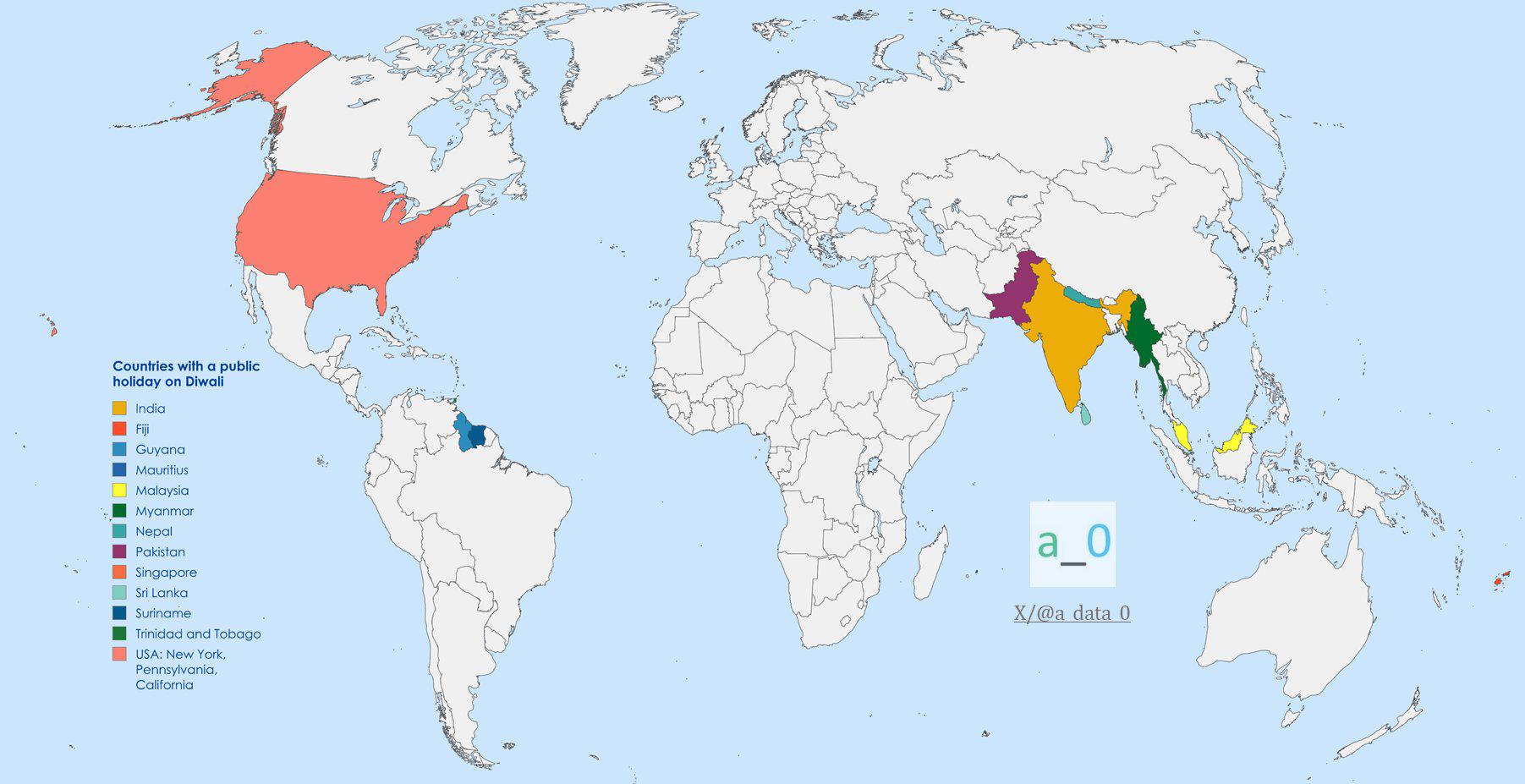Countries with a Public Holiday on Diwali Map


Marcus Rodriguez
Historical Geography Expert
Marcus Rodriguez specializes in historical cartography and geographic data analysis. With a background in both history and geography, he brings unique...
Geographic Analysis
What This Map Shows\nThis map displays the countries that officially recognize and celebrate Diwali as a public holiday. Diwali, also known as the Festival of Lights, is one of the most significant festivals in Hindu culture, symbolizing the victory of light over darkness and good over evil. The visualization highlights various nations where this vibrant celebration is observed, showcasing the cultural reach of Diwali beyond India, where it originated.
Deep Dive into Diwali Celebrations\nDiwali is celebrated by millions around the world, primarily by Hindus, Jains, Sikhs, and some Buddhists. The festival typically spans five days and involves a variety of rituals, including the lighting of oil lamps (diyas), fireworks, feasting, and the exchange of gifts. Interestingly, the festival is not just limited to India; its observance has spread widely due to migration and the Indian diaspora.
In India, Diwali is a national holiday, but the way it is celebrated can vary significantly from region to region. For example, in Northern India, the festival marks the return of Lord Rama to Ayodhya after defeating the demon king Ravana, while in Southern India, it commemorates Lord Krishna's victory over the demon Narakasura. Such regional variations add to the richness of the celebration.
However, outside of India, Diwali has also found its place in various countries. In Nepal, Diwali is celebrated as Tihar, a festival honoring different animals, while in Sri Lanka, it has a significant following among Tamil Hindus. Countries like Mauritius and Fiji have also embraced the festival due to their substantial Indian populations, leading to vibrant public celebrations.
The map also indicates countries like Trinidad and Tobago, where Diwali is recognized as a public holiday, reflecting the island's rich Indian heritage. In the UK, while Diwali is not an official public holiday, it is celebrated with considerable enthusiasm, particularly in cities with large Indian communities, such as Leicester and London.
Regional Analysis\nWhen analyzing the map, it's clear that South Asia is heavily represented, with India and Nepal leading the celebrations. In India, Diwali is often marked by a week-long holiday, where businesses close, families gather, and festivities fill the streets. In contrast, Nepal celebrates Tihar with a slightly different focus, emphasizing the worship of animals like crows, dogs, and cows, showcasing the festival's adaptability and local significance.
Moving to the Caribbean, Trinidad and Tobago stands out with its official recognition of Diwali as a public holiday since 1966. The diverse cultural fabric of the islands allows for a unique blend of Hindu traditions with local customs, resulting in colorful parades and communal festivities.
In the Pacific, Fiji also celebrates Diwali as a national holiday, which is fascinating considering the island nation's multicultural society. The Fijian Indian community plays a vital role in keeping the traditions alive, with Diwali being an occasion for family reunions and community bonding.
Interestingly, the map also reveals smaller but significant observances in countries like Australia and Canada, where growing Indian immigrant populations have led to increased recognition and celebration of Diwali. In these nations, local governments often organize public events, fireworks, and cultural programs, bringing the festival to a broader audience and fostering multicultural understanding.
Significance and Impact\nUnderstanding the global celebration of Diwali is essential, as it reflects broader themes of cultural integration and diversity. As more countries recognize Diwali as a public holiday, it symbolizes the acceptance and appreciation of cultural differences. This is particularly important in today's increasingly globalized world, where communities are more interconnected than ever.
Moreover, the celebration of Diwali contributes to local economies through tourism and hospitality. Festivals attract visitors, promote local businesses, and offer communities the chance to showcase their cultural heritage. Events surrounding Diwali often include markets, food festivals, and cultural performances, which can significantly boost local economies.
Looking towards the future, the recognition of Diwali in more countries could trend upwards, especially as awareness of cultural diversity continues to grow. The festival's emphasis on light and joy resonates universally, making it a powerful symbol of unity and hope in times of darkness. As such, Diwali's observance offers a unique opportunity for dialogue and cultural exchange, allowing people from different backgrounds to come together and celebrate shared values of peace and goodwill.
Visualization Details
- Published
- October 21, 2025
- Views
- 26
Comments
Loading comments...